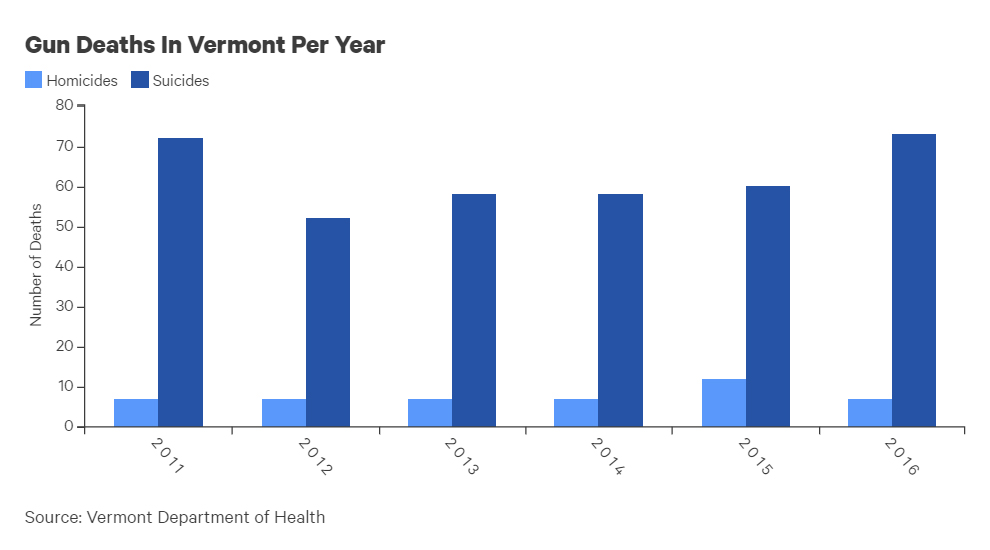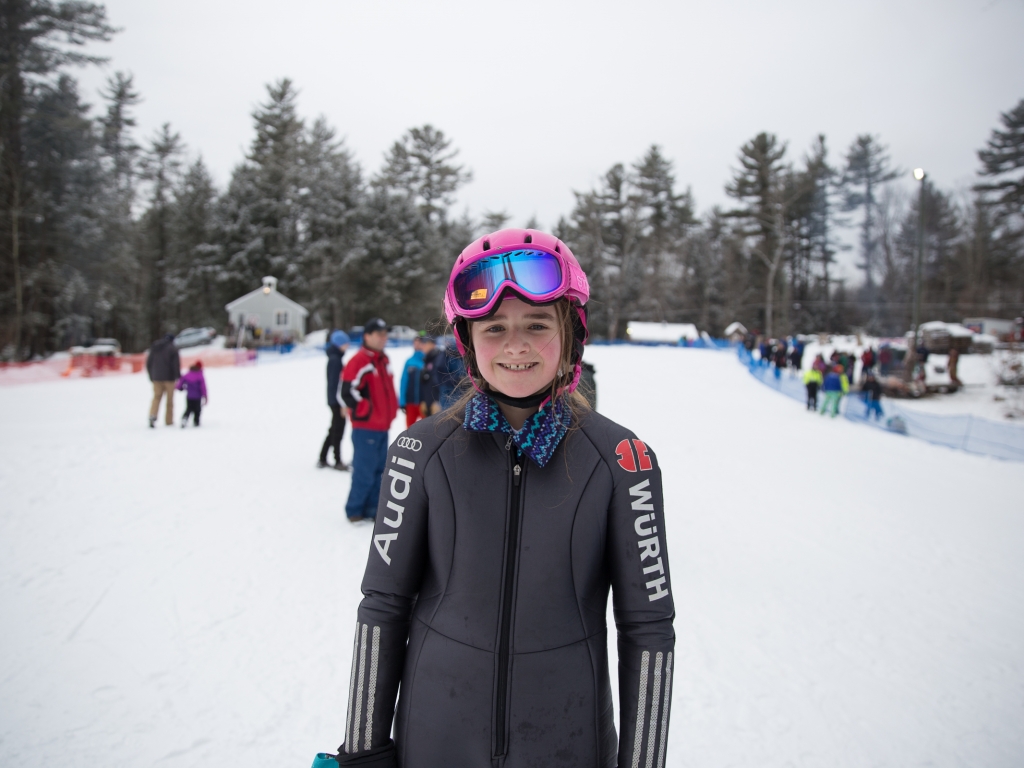Episode 78: Wicked

This week, some interviews and stories from the archive. We look at the data on gun deaths in Vermont, and think through ways to prevent suicides in places where gun ownership is part of life for many. Plus, Orange is the New Black actress Yael Stone reveals the thinking behind her character’s blend of Boston and Brookyln accents, and we talk with a linguist about how the way New Englanders talk is changing. Also, wicked powda, wicked cheap: a visit to a down-home mountain where skiing is affordable for the masses.
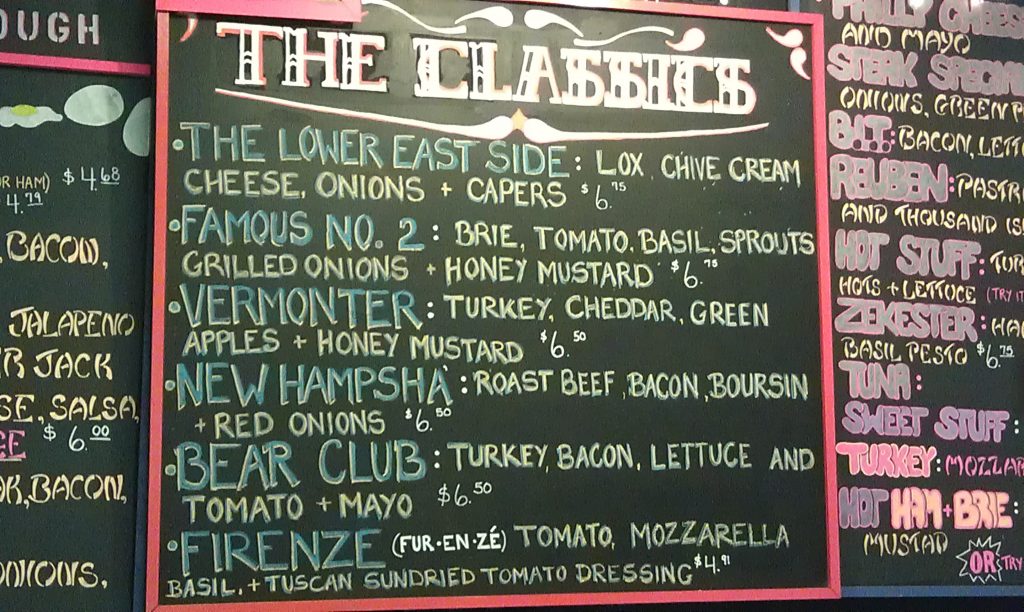
Can you spot the dialect difference in this bagel shop menu? From the (now closed) Bagel Basement in Hanover, New Hampshire. Courtesy of James Stanford
Under the Gun
For many people in Vermont, guns are a way of life. Unlike more populous, more urban states in our region, Vermonters own guns at a higher rate, and fiercely protect their gun rights. That means looser gun laws than in Massachusetts, Connecticut, and Rhode Island; but also a higher per capita rate of gun deaths than in those states.
Reporters at Vermont Public Radio looked into the numbers behind this reality, and found some surprising data and personal stories. They learned that 420 people died from gunshot wounds in Vermont between 2011 and 2016. Eighty-nine percent of those deaths were suicides.
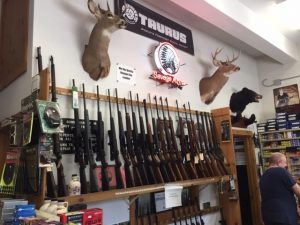
Cragin’s Gun Shop in Rutland, Vt. primarily serves hunters. Owner John Cragin said suicide is a tricky issue – but if he has any doubts about selling someone a gun, he won’t make the sale. Photo by Liam Elder-Connors for VPR
Our guest Taylor Dobbs produced the reporting project “Gunshots: Vermont Gun Deaths, 2011-2016″ last summer, when he was digital reporter at Vermont Public Radio. (Dobbs is now an investigative and statehouse reporter for Seven Days.)
We were also joined by Matthew Miller, M.D., a professor of health sciences and Epidemiology at Northeastern University and co-director of the Harvard Injury Control Research Center.
VPR has made the death certificate data gathered for the project public. You can find a spreadsheet here.
The Shifting New England Accent
The Netflix prison drama “Orange is the New Black” features a woman with a Boston-flavored accent. Bit this character’s way of talking is complicated, and so is her story. Developing that sound brought actress Yael Stone to Boston. There, she she met up with WBUR’s Sarah Rose Brenner, who has this report.
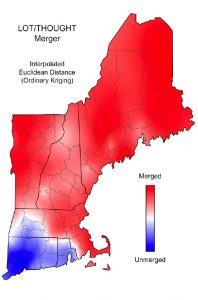
A linguistic map based on 626 recent recordings collected by James Stanford and others from speakers around New England. Speakers in the red areas tend to pronounce the vowels in the words “lot” and “thought” the same way. Speakers in blue areas tend to pronounce the vowels in each word differently.
Dropped Rs and long As can be heard, of course, not only in Boston, but across much of New England.
Yet in a 2012 paper published in the Journal of American Speech, Dartmouth College linguist James Stanford and his colleagues made the case that a classic New England accent is receding.
In a recent study, Stanford and his partners used an online crowd-sourcing tool to reach over 600 speakers around the region. This big data set allowed them to tease out subtle differences in the way people from different parts of New England talk. Their results will be published this year in American Speech.
James Stanford joined us to discuss some of his team’s findings. Chaeyoon Kim, Sravana Reddy, Ezra Wyschogrod, and Jack Grieve are co-authors on the study.
For a deep dive into the Vermont accent, we highly recommend the very first episode of Vermont Public Radio’s podcast Brave Little State.
Are you proud of your accent? A little embarrassed? Or maybe you don’t have an accent at all (or you don’t think you do!) Tell us about it on Twitter or Facebook. You can also record yourself –or your loved one– on your phone’s voice recorder/ voice memo app. Send a clip to next@wnpr.org.
Powder to the People
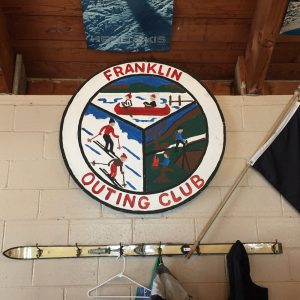
A hand-painted sign hangs on the wall at the Veterans Memorial Recreation Area in Franklin, New Hampshire. Photo courtesy of NHPR.
Here in New England, downhill skiing comes with a high price tag and a ritzy reputation. A lift ticket at Sugarloaf in Maine will run you $95, and at Jay Peak in Vermont, the price is $84. Even at Ski Sundown, a small mountain in Connecticut, getting on the slopes on a Saturday or Sunday costs $60.
But at Veterans Memorial Ski Area in Franklin, New Hampshire, admission is just $20. Instead of a chair lift, there’s a metal bar that goes behind the thighs, attached to a rope that pulls skiers up the 230-foot hill.
Once upon a time, these no-frills ski areas were the rule in New England, rather than the exception. So what happened? The team at New Hampshire Public Radio’s podcast Outside/In went to Franklin to figure out how skiing “got fancy.”
For more, listen to the full Outside/In episode, “Gnar Pow.”
Connecticut is not known for big mountains. But if you travel to the far northwest corner, the Berkshires rise to nearly 2400 feet in the tiny town of Salisbury. It’s there that you find a little piece of Nordic sporting history.
For 92 years, Salisbury has been hosting “Jumpfest,” a celebration of ski jumping. During the main event, skiers in brightly colored suits fly off a snow-covered ramp, on top of a 220-foot hill.
Spectators ring cowbells and drink hot toddies, but this isn’t just for fun. The competition is a qualifier for the junior nationals, and most of the jumpers on the big hill are between 12 and 16. NEXT producer Andrea Muraskin paid a visit to last year’s festival and brought back this audio postcard.
The 2018 Jumpfest runs February 9 through 11, and is open to the public.
About NEXT
NEXT is produced at WNPR.
Host: John Dankosky
Producer: Andrea Muraskin
Executive Producer: Catie Talarski
Contributors to this episode: Taylor Dobbs, Sarah Rose Brenner, Sam Evans-Brown, Jimmy Gutierrez, and Maureen McMurray
Music: Todd Merrell, “New England” by Goodnight Blue Moon
We appreciate your feedback! Send praise, critique, suggestions, questions, story leads, and recordings of your uncle’s accent to next@wnpr.org.

